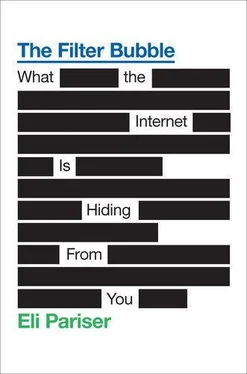118 Google is working on it:Jonathan McPhie, phone interview with author, Oct. 13, 2010.
119 the “toxic knowledge” that might result:Mark Rothstein, as quoted in Cynthia L. Hackerott, J.D., and Martha Pedrick, J.D., “Genetic Information Nondiscrimination Act Is a First Step; Won’t Solve the Problem,” Oct. 1, 2007, accessed Feb. 9, www.metrocorpcounsel.com/current.php?artType=view&artMonth=January&artYear=2011&EntryNo=7293.
119 “The digital ghost of Jay Gatz”:Siva Vaidyanathan, “Naked in the ‘Nonopticon,’” Chronicle Review 54, no. 23: B7.
120 “high cognition” arguments:Dean Eckles, phone interview with author, Nov. 9, 2010.
120 increase the effectiveness of marketing:Ibid.
122 pitches framed as sweepstakes:PK List Marketing, “Free to Me—Impulse Buyers,” accessed Jan. 28, 2011, www.pklistmarketing.com/Data%20Cards/Opportunity%20Seekers%20&%20Sweepstakes%20Participants/Cards/Free%20To%20Me%20-%20Impulse%20Buyers.htm.
123 “smartphone to be doing searches constantly”:Robert Andrews, “Google’s Schmidt: Autonomous, Fast Search Is ‘Our New Definition,’” paidContent , Sept. 7, 2010, accessed Dec. 15, 2010, http://paidcontent.co.uk/article/419-googles-schmidt-autonomous-fast-search-is-our-new-definition.
124 “ ‘Not-So-Minimal’ Consequences of Television News”:Shanto Iyengar, Mark D. Peters, and Donald R. Kinder, “Experimental Demonstrations of the ‘Not-So-Minimal’ Consequences of Television News Programs,” American Political Science Review 76, no. 4 (1982): 848–58.
124 “believe that defense or pollution”:Ibid.
124 strength of this priming effect:Drew Westen, The Political Brain: The Role of Emotion in Deciding the Fate of the Nation (Cambridge, MA: Perseus, 2007).
125 study by Hasher and Goldstein:Lynn Hasher and David Goldstein, “Frequency and the Conference of Referential Validity,” Journal of Verbal Learning and Verbal Behaviour 16 (1977): 107–12.
126 “surrounded by downward-sloping land”:Matt Cohler, phone interview with author, Nov. 23, 2010.
128 results had been randomly redistributed:Robert Rosenthal and Lenore Jacobson, “Teachers’ Expectancies: Determinants of Pupils’ IQ Gains,” Psychological Reports, 19 (1966): 115–18.
129 “network-based categorizations”:Dalton Conley, Elsewhere, U.S.A.: How We Got from the Company Man, Family Dinners, and the Affluent Society to the Home Office, BlackBerry Moms, and Economic Anxiety (New York: Pantheon, 2008), 164.
130 “Model-T version of what’s possible”:Geoff Duncan, “Netflix Offers $1Mln for Good Movie Picks,” Digital Trends, Oct. 2, 2006, accessed Dec. 15, 2010, www.digitaltrends.com/computing/netflix-offers-1-mln-for-good-movie-picks.
130 “a PC and some great insight”:Katie Hafner, “And If You Liked the Movie, a Netflix Contest May Reward You Handsomely,” New York Times, Oct. 2, 2006, accessed Dec. 15, 2010, www.nytimes.com/2006/10/02/technology/02netflix.html.
131 success using social-graph data:Charlie Stryler ,Marketing Panel at 2010 Social Graph Symposium, Microsoft Campus, Mountain View, CA, May 21, 2010.
132 “the creditworthiness of your friends”:Julia Angwin, “Web’s New Gold Mine,” Wall Street Journal , July 30, 2010, accessed on Feb. 7, 2011, http://online.wsj.com/article/SB10001424052748703940904575395073512989404.html.
133 reality doesn’t work that way:David Hume, An Enquiry Concerning Human Understanding , Harvard Classics, volume 37, Section VII, Part I, online edition, (P. F. Collier & Son; 1910), accessed Feb. 7, 2011, http://18th.eserver.org/hume-enquiry.html.
133 purpose of science, for Popper:Karl Popper, The Logic of Scientific Discovery (New York: Routledge, 1992).
135 “no more incidents or adventures in the world”:Fyodor Dostoevsky, Notes from Underground, trans. Richard Pevear and Laura Volokhonsky (New York: Random House, 1994), 24.
Chapter Five: The Public Is Irrelevant
137 “others who see what we see”:Hannah Arendt, The Portable Hannah Arendt (New York: Penguin, 2000), 199.
137 “neutralize the influence of the newspapers”:Alexis de Tocqueville, Democracy in America (New York: Penguin, 2001).
138 “a gross violation of Chinese sovereignty”:“NATO Hits Chinese Embassy,” BBC News, May 8, 1999, accessed Dec. 17, 2010, http://news.bbc.co.uk/2/hi/europe/338424.stm.
138 “most vital are the largely anonymous online forums”:Tom Downey, “China’s Cyberposse,” New York Times, Mar. 3, 2010, accessed Dec. 17, 2010, www.nytimes.com/2010/03/07/magazine/07Human-t.html?pagewanted=1.
138 “an elite, wired section of the population”:Shanthi Kalathil and Taylor Boas, “Open Networks, Closed Regimes: The Impact of the Internet on Authoritarian Rule,” First Monday 8, no. 1–6 (2003).
139 “Shareholders want to make money”:Clive Thompson, “Google’s China Problem (and China’s Google Problem),” New York Times, Apr. 23, 2006, accessed Dec. 17, 2010, www.nytimes.com/2006/04/23/magazine/23google.html.
139 “What the government cares about”:James Fallows, “The Connection Has Been Reset,” Atlantic, Mar. 2008, accessed Dec. 17, 2010, www.theatlantic.com/magazine/archive/2008/03/-ldquo-the-connection-has-been-reset-rdquo/6650.
139 “peer pressure, and self-censorship”:Fallows, “Connection Has Been Reset.”
140 “sense that they’re looking at everything”:Thompson, “Google’s China Problem.”
140 “Internet Police will maintain order”:Hong Yan, “Image of Internet Police: JingJang and Chacha Online,” China Digital Times, Feb. 8, 2006, accessed Dec. 17, 2010, http://chinadigitaltimes.net/china/internet-police/page/2.
140 “see my friends, live happily”:Thompson, “Google’s China Problem.”
140 “if Internet users have some porn”:Associated Press, “Web Porn Seeps Through China’s Great Firewall,” July 22, 2010, accessed Dec. 17, 2010, www.cbsnews.com/stories/2010/07/22/tech/main6703860.shtml.
141 “trying to nail Jell-O to the wall”:Bill Clinton, “America’s Stake in China,” Blueprint , June 1, 2000, accessed Dec. 17, 2010, www.dlc.org/ndol_ci.cfm?kaid=108&subid=128&contentid=963.
142 “able to get handheld American flags?”:Laura Miller and Sheldon Rampton, “The Pentagon’s Information Warrior: Rendon to the Rescue,” PR Watch 8, no. 4 (2001).
142 “border patrols [are] replaced by beaming patrols”:John Rendon, as quoted in Franklin Foer, “Flacks Americana,” New Republic , May 20, 2002, accessed Feb. 9, 2011, www.tnr.com/article/politics/flacks-americana?page=0,2.
142 thesaurus:John Rendon, phone interview by author, Nov. 1, 2010.
143 “consume, distribute, and create”:Eric Schmidt and Jared Cohen, “The Digital Disruption: Connectivity and the Diffusion of Power,” Foreign Affairs ( Nov.–Dec. 2010).
144 Flatow was an Olympic gymnast:Stephen P. Halbrook, “‘Arms in the Hands of Jews Are a Danger to Public Safety’: Nazism, Firearm Registration, and the Night of the Broken Glass, St. Thomas Law Review 21 (2009): 109–41, 110, www.stephenhalbrook.com/law_review_articles/Halbrook_macro_final_3_29.pdf.
Читать дальше











